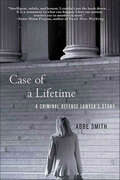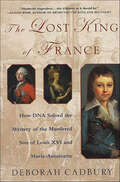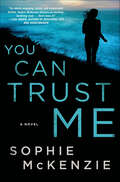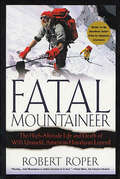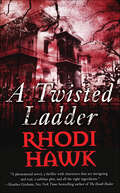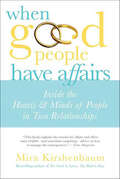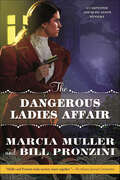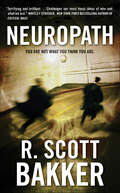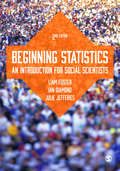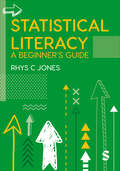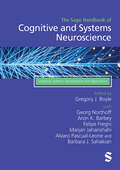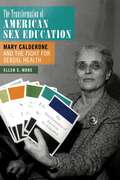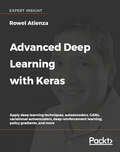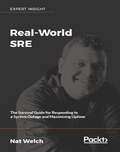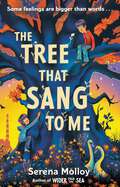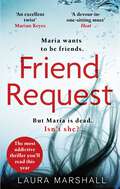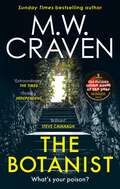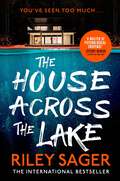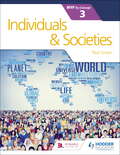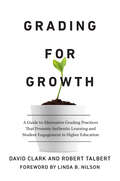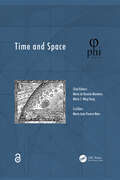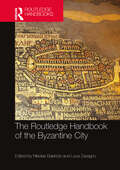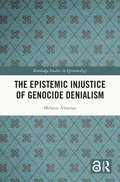- Table View
- List View
Case of a Lifetime: A Criminal Defense Lawyer's Story
by Abbe SmithA recent study estimates that thousands of innocent people are wrongfully imprisoned each year in the United States. Some are exonerated through DNA evidence, but many more languish in prison because their convictions were based on faulty eyewitness accounts and no DNA is available. Prominent criminal lawyer and law professor Abbe Smith weaves together real life cases to show what it is like to champion the rights of the accused. Smith describes the moral and ethical dilemmas of representing the guilty and the weighty burden of fighting for the innocent, including the victorious story of how she helped free a woman wrongly imprisoned for nearly three decades.For fans of Law and Order and investigative news programs like 20/20, Case of a Lifetime is a chilling look at what really determines a person's innocence.
The Lost King of France: How DNA Solved the Mystery of the Murdered Son of Louis XVI and Marie-Antoinette
by Deborah CadburyRoyalty, revolution, and scientific mystery---the dramatic true account of the fate of Louis XVII, son of Marie Antoinette, and an extraordinary detective story that spans more than two hundred years.Louis-Charles, Duc de Normandie, enjoyed a charmed early childhood in the gilded palace of Versailles. At the age of four, he became the dauphin, heir to the most powerful throne in Europe. Yet within five years he was to lose everything. Drawn into the horror of the French Revolution, his family was incarcerated and their fate thrust into the hands of the revolutionaries who wished to destroy the monarchy.In 1793, when Marie Antoinette was beheaded at the guillotine, she left her adored eight-year-old son imprisoned in the Temple Tower. Far from inheriting a throne, the orphaned boy-king had to endure the hostility and abuse of a nation. Two years later, the revolutionary leaders declared Louis XVII dead. No grave was dug, no monument built to mark his passing.Immediately, rumors spread that the prince had, in fact, escaped from prison and was still alive. Others believed that he had been murdered, his heart cut out and preserved as a relic. As with the tragedies of England's princes in the Tower and the Romanov archduchess Anastasia, countless "brothers" soon approached Louis-Charles's older sister, Marie-Therese, who survived the revolution. They claimed not only the dauphin's name, but also his inheritance. Several "princes" were plausible, but which, if any, was the real heir to the French throne?The Lost King of France is a moving and dramatic tale that interweaves a pivotal moment in France's history with a compelling detective story that involves pretenders to the crown, royalist plots and palace intrigue, bizarre legal battles, and modern science. The quest for the truth continued into the twenty-first century, when, thanks to DNA testing, the strange odyssey of a stolen heart found within the royal tombs brought an exciting conclusion to the two-hundred-year-old mystery of the lost king of France.
You Can Trust Me: A Novel
by Sophie McKenzieFrom Sophie McKenzie, bestselling and award-winning author of Girl, Missing and Sister, MissingOn a quiet, sunny Sunday morning, Livy arrives at her best friend Julia's apartment for a lunch date only to find her dead. Though all the evidence supports it, Livy cannot accept the official ruling of suicide; the Julia she remembers was loud, inappropriate, joyful, outrageous and loving, not depressed. The suspicious circumstances cause Livy to dig further, and she is suddenly forced to confront a horrifying possibility: that Julia was murdered, by the same man who killed Livy's sister, Kara, eighteen years ago.Desperate to understand the tragedies of her past and hold her unraveling life together, Livy throws herself into the search for Kara and Julia's killer, who she now believes is someone close to her family. But if that is true, can she still trust anyone? Damien, the man Julia was secretly dating? Leo, her husband's boss and a close family friend? His son Paul, her husband's best mate since college? Or even Will, her own dear husband, who has betrayed her perhaps one time too many?And when Livy finally faces her sister's killer, and he traps her with one horrible, impossible choice, she must finally decide: is she strong enough to trust herself?Get lost in the dark, gripping pages of You Can Trust Me.
Fatal Mountaineer: The High-Altitude Life and Death of Willi Unsoeld, American Himalayan Legend
by Robert RoperRobert Roper's Fatal Mountaineer is a gripping look at Willi Unsoeld and the epic climbs that defined him--a classic narrative blending action with ethics, fame with tragedy, a man's ambition with a father's anguish.In 1963, Willi Unsoeld became an international hero for his conquest of the West Ridge of Everest. A charismatic professor of philosophy, Unsoeld was one of the greatest climbers of the twentieth century, a man whose raw physical power and casual fearlessness inspired a generation of adventurers. In 1976, during an expedition to Nanda Devi, the tallest peak in India, Unsoeld's philosophy of spiritual growth through mortal risk was tragically tested. The outcome of that expedition continues to fuel one of the most fascinating debates in mountaineering history.
A Twisted Ladder (Devils of the Briar #1)
by Rhodi HawkPsychologist Madeleine LeBlanc has spent her whole career trying to determine the cause of her father's schizophrenia. She always felt that she could unravel its origins and cure the man who left her and her brother, Marc, to practically raise themselves on the Louisiana Bayou. But when Marc takes his own life on a fishing boat in the middle of Bayou Black, Madeleine embarks on a journey into her family history---to a time when the antebellum era was crumbling, and the line between servant and master was starting to fade. And the more she pries the more she reveals her family's dark past, rife with conjured demons and river magic gone awry. Madeleine's only hope to save herself is to face the ghosts of the past, the dangers of the present, and the twisted ladder that links them all together.At the Publisher's request, this title is being sold without Digital Rights Management Software (DRM) applied.
When Good People Have Affairs: Inside the Hearts & Minds of People in Two Relationships
by Mira KirshenbaumA world-renowned therapist, Mira Kirshenbaum has treated thousands of men and women caught in the powerful drama over what to do when an affair reaches into their emotional lives. Now, in When Good People Have Affairs, Kirshenbaum puts her unsurpassed experience into one clear, calming place. She gives readers everything they need to cut through the thickets of fear, hurt and confusion to find their ways to happier, more solid relationships with the person who's right for them. For example, Kirshenbaum identifies seventeen types of affairs, helping readers figure out which type they're in and what it means. Is it a:--"See-if" affair?--Ejector-seat affair?--Distraction affair?--Unmet-needs affair?--Panic affair?Kirshenbaum encourages honest answers to such questions as:--What am I missing in my marriage?--How do I decide between two people when it's like comparing an apple to an orange?--How do I decide to end my marriage, end my affair, or end them both?She leads readers through six easy-to-navigate steps that will take anyone from anxiety to clarity. When Good People Have Affairs will be a lifeline to any man or woman who feels caught between two lovers, and its insights are indispensable to anyone else touched by an affair.
The Dangerous Ladies Affair: A Carpenter And Quincannon Mystery (The Carpenter and Quincannon Mysteries #5)
by Marcia Muller Bill PronziniFor the firm of Carpenter and Quincannon, Professional Detective Services, stopping extortionists is not only grand, but excitingly lucrative. When a pleasant afternoon’s bicycling through Golden Gate Park with a friend ends with the revelation of threatening letters, followed by a gunshot in a mansion garden, Sabina Carpenter knows this is a case that demands her immediate and undivided attention. The questions her partner John Quincannon has to unravel are not difficult: Wrixton, a wealthy banker, has met his extortionist's first demand, but the order to pay another $5,000 is too much to face. The banker’s real problem is something he doesn't want to reveal. That was fine with the detective, and when he was informed that some private letters were involved and Wrixton absolutely needed them back, there was nothing more Quincannon needed in the way of background. As with so many of San Francisco’s elite, the bedroom doors never seemed to stay shut.That was the easy part; far more difficult was the matter of the dead courier, murdered most foully in a locked room within a locked room, creating a trail that will take John Quincannon through most of San Francisco’s less savory places and end with a riverboat trip that is anything but a relaxing cruise.The Dangerous Ladies Affair is the next thrilling installment in this charming historical mystery series from MWA Grand Masters Marcia Muller and Bill Pronzini.The Carpenter and Quincannon Mysteries:#1 The Bughouse Affair#2 The Spook Lights Affair#3 The Body Snatchers Affair#4 The Plague of Thieves Affair#5 The Dangerous Ladies Affair#6 The Bags of Tricks AffairAt the Publisher's request, this title is being sold without Digital Rights Management Software (DRM) applied.
Neuropath
by R. Scott BakkerTom's life is not what it once was. His marriage to the beautiful Nora is on the rocks and he now sees his two young children only on her say-so. His best friend Neil has moved to California to teach neurology. He has one success - a book on human psychology. Tom wiles away the time trying to teach bored grad students. But that all changes when Neil comes back into his life. For it seems that Tom's best friend was working for the National Security Agency, cracking the minds of suspected terrorists. Now it is Neil himself who has cracked and gone AWOL - what's more, he has left behind evidence that he has been employing his unique skills on civilians - obsessed with the idea that he can control the human brain. Thus begins a terrifying sequence of events as Neil starts to kidnap and mutilate people with a connection to Tom. He damages their brains and then releases them - often leaving them mad. But only when he gets near his ultimate target does he reveal the full horror of his plan . . . in R. Scott Bakker's Neuropath.At the Publisher's request, this title is being sold without Digital Rights Management Software (DRM) applied.
Beginning Statistics: An Introduction for Social Scientists
by Liam Foster Ian Diamond Julie BantonIn the Second Edition of this bestselling textbook, the authors use real-world examples to introduce basic principles in statistics with no prior knowledge or experience assumed. With an emphasis on describing concepts, showing through example and illustrating points with graphs and displays, this book will provide readers with a step-by-step introduction to using statistics. Chapters address the following questions: Why bother learning statistics in the first place and are they relevant to real life? How do I make sensible tables and informative graphs? What are descriptive and inferential statistics and how are they used? What are regression and correlation anyway?
Statistical Literacy: A Beginner′s Guide
by Rhys Christopher JonesIn an increasingly data-centric world, we all need to know how to read and interpret statistics. But where do we begin? This book breaks statistical terms and concepts down in a clear, straightforward way. From understanding what data are telling you to exploring the value of good storytelling with numbers, it equips you with the information and skills you need to become statistically literate. It also: Dispels misconceptions about the nature of statistics to help you avoid common traps. Helps you put your learning into practice with over 60 Tasks and Develop Your Skills activities. Draws on real-world research to demonstrate the messiness of data – and show you a path through it. Approachable and down to earth, this guide is aimed at undergraduates across the social sciences, psychology, business and beyond who want to engage confidently with quantitative methods or statistics. It forms a reassuring aid for anyone looking to understand the foundations of statistics before their course advances, or as a refresher on key content.
The Sage Handbook of Cognitive and Systems Neuroscience: Cognitive Systems, Development and Applications
by Gregory J. Boyle Georg Northoff Aron K. Barbey Felipe Fregni Marjan Jahanshahi Alvaro Pascual-Leone Barbara J. SahakianCognitive neuroscience is the interdisciplinary study of how cognitive and intellectual functions are processed and represented within the brain, which is critical to building understanding of core psychological and behavioural processes such as learning, memory, behaviour, perception, and consciousness. Understanding these processes not only offers relevant fundamental insights into brain-behavioural relations, but may also lead to actionable knowledge that can be applied in the clinical treatment of patients with various brain-related disabilities. This Handbook examines complex cognitive systems through the lens of neuroscience, as well as providing an overview of development and applications within cognitive and systems neuroscience research and beyond. Containing 35 original, state of the art contributions from leading experts in the field, this Handbook is essential reading for researchers and students of cognitive psychology, as well as scholars across the fields of neuroscientific, behavioural and health sciences. Part 1: Attention, Learning and Memory Part 2: Language and Communication Part 3: Emotion and Motivation Part 4: Social Cognition Part 5: Cognitive Control and Decision Making Part 6: Intelligence
The Sage Handbook of Cognitive and Systems Neuroscience: Cognitive Systems, Development and Applications
by Gregory J. Boyle Georg Northoff Aron K. Barbey Felipe Fregni Marjan Jahanshahi Alvaro Pascual-Leone Barbara J. SahakianCognitive neuroscience is the interdisciplinary study of how cognitive and intellectual functions are processed and represented within the brain, which is critical to building understanding of core psychological and behavioural processes such as learning, memory, behaviour, perception, and consciousness. Understanding these processes not only offers relevant fundamental insights into brain-behavioural relations, but may also lead to actionable knowledge that can be applied in the clinical treatment of patients with various brain-related disabilities. This Handbook examines complex cognitive systems through the lens of neuroscience, as well as providing an overview of development and applications within cognitive and systems neuroscience research and beyond. Containing 35 original, state of the art contributions from leading experts in the field, this Handbook is essential reading for researchers and students of cognitive psychology, as well as scholars across the fields of neuroscientific, behavioural and health sciences. Part 1: Attention, Learning and Memory Part 2: Language and Communication Part 3: Emotion and Motivation Part 4: Social Cognition Part 5: Cognitive Control and Decision Making Part 6: Intelligence
Statistical Literacy: A Beginner′s Guide
by Rhys Christopher JonesIn an increasingly data-centric world, we all need to know how to read and interpret statistics. But where do we begin? This book breaks statistical terms and concepts down in a clear, straightforward way. From understanding what data are telling you to exploring the value of good storytelling with numbers, it equips you with the information and skills you need to become statistically literate. It also: Dispels misconceptions about the nature of statistics to help you avoid common traps. Helps you put your learning into practice with over 60 Tasks and Develop Your Skills activities. Draws on real-world research to demonstrate the messiness of data – and show you a path through it. Approachable and down to earth, this guide is aimed at undergraduates across the social sciences, psychology, business and beyond who want to engage confidently with quantitative methods or statistics. It forms a reassuring aid for anyone looking to understand the foundations of statistics before their course advances, or as a refresher on key content.
The Transformation of American Sex Education: Mary Calderone and the Fight for Sexual Health
by Ellen S. MoreA comprehensive history of the battle over sex education in the United StatesMid-century America had a problem talking about sex. Dr. Mary Calderone first diagnosed this condition and, in 1964, led the uphill battle to de-stigmatize sex education. Supporters hailed her as the “grandmother of modern sex education” while her detractors painted her as an “aging libertine,” but both could agree that she was quickly shaping the way sex was discussed in the classroom. Part biography, part social history, The Transformation of American Sex Education for the first time situates Dr. Mary Calderone at the center of decades of political, cultural, and religious conflict in the fight for comprehensive sex education. Ellen S. More examines Americans’ attempts to come to terms with the vexed subject of sex education in schools from the late 1940s to the early twenty-first century. Using Mary Calderone’s life and career as a touchstone, she traces the origins of modern sex education in the United States from the work of a group of reformers who coalesced around Calderone to create the Sexuality Information and Education Council of the United States (SIECUS) in 1964, to the development and use of the competing approaches known as “abstinence-based” and “comprehensive” sex education from the 1980s into the twenty-first century. A fascinating and timely read, The Transformation of American Sex Education provides a substantial contribution to the history of one of America’s most intense and protracted culture wars, and the first account of the woman who fought those battles.
Advanced Deep Learning with Keras: Apply deep learning techniques, autoencoders, GANs, variational autoencoders, deep reinforcement learning, policy gradients, and more
by Rowel AtienzaUnderstanding and coding advanced deep learning algorithms with the most intuitive deep learning library in existenceKey FeaturesExplore the most advanced deep learning techniques that drive modern AI resultsImplement deep neural networks, autoencoders, GANs, VAEs, and deep reinforcement learningA wide study of GANs, including Improved GANs, Cross-Domain GANs, and Disentangled Representation GANsBook DescriptionRecent developments in deep learning, including Generative Adversarial Networks (GANs), Variational Autoencoders (VAEs), and Deep Reinforcement Learning (DRL) are creating impressive AI results in our news headlines - such as AlphaGo Zero beating world chess champions, and generative AI that can create art paintings that sell for over $400k because they are so human-like. Advanced Deep Learning with Keras is a comprehensive guide to the advanced deep learning techniques available today, so you can create your own cutting-edge AI. Using Keras as an open-source deep learning library, you'll find hands-on projects throughout that show you how to create more effective AI with the latest techniques. The journey begins with an overview of MLPs, CNNs, and RNNs, which are the building blocks for the more advanced techniques in the book. You’ll learn how to implement deep learning models with Keras and TensorFlow 1.x, and move forwards to advanced techniques, as you explore deep neural network architectures, including ResNet and DenseNet, and how to create autoencoders. You then learn all about GANs, and how they can open new levels of AI performance. Next, you’ll get up to speed with how VAEs are implemented, and you’ll see how GANs and VAEs have the generative power to synthesize data that can be extremely convincing to humans - a major stride forward for modern AI. To complete this set of advanced techniques, you'll learn how to implement DRL such as Deep Q-Learning and Policy Gradient Methods, which are critical to many modern results in AI.What you will learnCutting-edge techniques in human-like AI performanceImplement advanced deep learning models using KerasThe building blocks for advanced techniques - MLPs, CNNs, and RNNsDeep neural networks – ResNet and DenseNetAutoencoders and Variational Autoencoders (VAEs)Generative Adversarial Networks (GANs) and creative AI techniquesDisentangled Representation GANs, and Cross-Domain GANsDeep reinforcement learning methods and implementationProduce industry-standard applications using OpenAI GymDeep Q-Learning and Policy Gradient MethodsWho this book is forSome fluency with Python is assumed. As an advanced book, you'll be familiar with some machine learning approaches, and some practical experience with DL will be helpful. Knowledge of Keras or TensorFlow 1.x is not required but would be helpful.
Real-World SRE: The Survival Guide for Responding to a System Outage and Maximizing Uptime
by Nat WelchThis hands-on survival manual will give you the tools to confidently prepare for and respond to a system outage. Key Features Proven methods for keeping your website running A survival guide for incident response Written by an ex-Google SRE expert Book Description Real-World SRE is the go-to survival guide for the software developer in the middle of catastrophic website failure. Site Reliability Engineering (SRE) has emerged on the frontline as businesses strive to maximize uptime. This book is a step-by-step framework to follow when your website is down and the countdown is on to fix it. Nat Welch has battle-hardened experience in reliability engineering at some of the biggest outage-sensitive companies on the internet. Arm yourself with his tried-and-tested methods for monitoring modern web services, setting up alerts, and evaluating your incident response. Real-World SRE goes beyond just reacting to disaster—uncover the tools and strategies needed to safely test and release software, plan for long-term growth, and foresee future bottlenecks. Real-World SRE gives you the capability to set up your own robust plan of action to see you through a company-wide website crisis. The final chapter of Real-World SRE is dedicated to acing SRE interviews, either in getting a first job or a valued promotion. What you will learn Monitor for approaching catastrophic failure Alert your team to an outage emergency Dissect your incident response strategies Test automation tools and build your own software Predict bottlenecks and fight for user experience Eliminate the competition in an SRE interview Who this book is for Real-World SRE is aimed at software developers facing a website crisis, or who want to improve the reliability of their company's software. Newcomers to Site Reliability Engineering looking to succeed at interview will also find this invaluable.
The Tree That Sang To Me
by Serena MolloySome feelings are so big, they're hard to express ... A dyslexia-friendly verse story of friendship, family and self-discovery, perfect for readers aged 9+, beautifully illustrated in black and white."A beautifully told story of resilience ..." Irish Times"With an uplifting ending, Kai's story will remain in your mind for a long time ... a fantastic read for a class group" Editor's Choice, Children's Books Ireland, Inis Magazine When Kai's big sister Jen leaves the family home, Kai knows it's all his fault. His secret burns, but he tells no one, just keeps pulling at tufts of his hair. But in the broad branches of a wasteland sycamore tree, Kai feels safe and free from his worries. Up there he feels he can be whoever he wants to be. And when a girl called Sky starts climbing Kai's tree, a friendship blossoms ... a friendship with the power to heal. Up hereit's likeI'm part of something elsethe windthe leavesthe airfree to bewhoever I want to be.
Friend Request: The most addictive psychological thriller you'll read this year
by Laura Marshall***THE SUNDAY TIMES & NO.1 EBOOK BESTSELLER***'Twisty and gripping' Erin Kelly'I read it in one go' Marian Keyes'I loved it' Rachel Abbott Don't miss Laura Marshall's addictive new thriller, MY HUSBAND'S KILLER. Available now!*****Maria Weston wants to be friends with me Maybe that had been the problem all along: Maria Weston had wanted to be friends with me, but I let her down.She's been hovering at the edge of my consciousness for all of my adult life, although I've been good at keeping her out, just a blurred shadow in the corner of my eye, almost but not quite out of sight.Maria Weston wants to be friends. But Maria Weston has been dead for more than twenty-five years. *****THE ADDICTIVE PSYCHOLOGICAL THRILLER THAT EVERYONE'S RAVING ABOUT 'The twist is genuinely unexpected . . . This is an obvious choice if you enjoyed The Girl on the Train' Independent'I couldn't put it down!' Jenny Blackhurst, author of The Foster Child'A mystery with a genius premise' Stylist'A devour-in-one-sitting must' Heat'Tightly plotted, and with a fabulous twist' Sunday Mirror'Gripping . . . loved it from start to finish' Goodreads Reviewer'Twisty and gripping . . . You must read this!' Emma Kavanagh, author of Falling'Twists and turns and real life scenarios make this a fantastic thriller' Amazon Reviewer
The Botanist: a gripping new thriller from The Sunday Times bestselling author (Washington Poe #5)
by M. W. Craven'Mesmerising, macabre and murderously funny. The Botanist is M.W. Craven at his sinister best. I couldn't love this series more' Chris Whitaker'Another classy thriller from the king of Cumbrian crime' Paul FinchThis is going to be the longest week of Washington Poe's life...Detective Sergeant Washington Poe can count on one hand the number of friends he has. And he'd still have his thumb left. There's the guilelessly innocent civilian analyst, Tilly Bradshaw of course. Insanely brilliant, she's a bit of a social hand grenade. He's known his beleaguered boss, Detective Inspector Stephanie Flynn for years as he has his nearest neighbour, full-time shepherd/part-time dog sitter, Victoria.And then there's Estelle Doyle. Dark and dangerous and sexy as hell. It's true the caustic pathologist has never walked down the sunny side of the street, but has she gone too far this time? Shot twice in the head, her father's murder appears to be an open and shut case. Estelle has firearms discharge residue on her hands, and, in a house surrounded by fresh snow, hers are the only footprints. Since her arrest she's only said three words: 'Tell Washington Poe.'Meanwhile, a poisoner called the Botanist is sending the nation's most reviled people poems and pressed flowers. Twisted and ingenious, he seems to be able to walk through walls and, despite the advance notice given to his victims, and regardless of the security measures taken, he is able to kill with impunity.Poe hates locked room mysteries and now he has two to solve. To unravel them he's going to have to draw on every resource he has: Tilly Bradshaw, an organised crime boss, even an alcoholic ex-journalist. Because if he doesn't, the bodies are going to keep piling up . . .Praise for The Botanist: 'Unputdownable, gripping, clever and with a rich seam of trademark Craven humour running through it' Imran Mahmood'A sinful treat' Vaseem Khan'Fast, furious, and utterly enjoyable.' Keith NixonPraise for M W Craven:The Curator shortlisted for the VN Thriller of the Year 2022 & longlisted for the Crime Writers' Association Gold Dagger 2021 Dead Ground longlisted for the Theakston Old Peculiar Crime Novel of the Year 2022 & longlisted for the Crime Writers' Association Ian Fleming Steel Dagger 2022'Heart-pounding, hilarious, sharp and shocking, Dead Ground is further proof that M.W. Craven never disappoints. Miss this series at your peril.' Chris Whitaker'Dark and entertaining, this is top rank crime fiction.' Vaseem Khan, Author of the Malabar House series and the Baby Ganesh Agency series'Fantastic' Martina Cole'Dark, sharp and compelling' Peter James'A brutal and thrilling page turner' The Sun'A thrilling curtain raiser for what looks set to be a great new series' Mick Herron'A powerful thriller from an explosive new talent. Tightly plotted, and not for the faint hearted!'David Mark'A gripping start to a much anticipated new series' Vaseem Khan
The House Across the Lake: the utterly gripping new psychological suspense thriller from the internationally bestselling author
by Riley SagerTHE INSTANT NEW YORK TIMES BESTSELLER FROM THE MASTER OF SUSPENSESomething is lurking beneath the water's surface... Recently widowed actress Casey Fletcher has escaped to her family's lake house for peace and quiet. She's been happily losing herself in her thoughts and several bottles of bourbon, until the glamorous couple across the lake catch her attention. They look so perfect - just like Casey and her husband used to be.But is anyone what they seem?Casey has a detective sat at her kitchen table.She has a man bound and gagged upstairs.Casey will uncover dark truths so life-changing that nothing will ever be the same again.International bestselling sensation Riley Sager is back with his most ambitious thriller yet. With his trademark blend of sharp characters, psychological suspense and gasp-worthy twists, The House Across the Lake will shock readers from the first page to the last.
Individuals and Societies for the IB MYP 3
by Paul GraceA concept-driven and assessment-focused approach to Individual and societies teaching and learning.- Approaches each chapter with statements of inquiry framed by key and related concepts, set in a global context- Supports every aspect of assessment using tasks designed by an experienced MYP educator- Differentiates and extends learning with research projects and interdisciplinary opportunities- Applies global contexts in meaningful ways to offer an MYP Individual and societies programme with an internationally-minded perspective
Grading for Growth: A Guide to Alternative Grading Practices that Promote Authentic Learning and Student Engagement in Higher Education
by David Clark Robert TalbertAre you satisfied with your current and traditional grading system? Does it accurately reflect your students’ learning and progress? Can it be gamed? Does it lead to grade-grubbing and friction with your students?The authors of this book – two professors of mathematics with input from colleagues across disciplines and institutions – offer readers a fundamentally more effective and authentic approach to grading that they have implemented for over a decade.Recognizing that traditional grading penalizes students in the learning process by depriving them of the formative feedback that is fundamental to improvement, the authors offer alternative strategies that encourage revision and growth.Alternative grading is concerned with students’ eventual level of understanding. This leads to big changes: Students take time to review past failures and learn from them. Conversations shift from “why did I lose a point for this” to productive discussions of content and process.Alternative grading can be used successfully at any level, in any situation, and any discipline, in classes that range from seminars to large multi-section lectures. This book offers a comprehensive introduction to alternative grading, beginning with a framework and rationale for implementation and evidence of its effectiveness. The heart of the book includes detailed examples – including variations on Standards-Based Grading, Specifications Grading, and ungrading -- of how alternative grading practices are used in all kinds of classroom environments, disciplines and institutions with a focus on first-hand accounts by faculty who share their practices and experience. The book includes a workbook chapter that takes readers through a step-by-step process for building a prototype of their own alternatively graded class and ends with concrete, practical, time-tested advice for new practitioners.The underlying principles of alternative grading involve·Evaluating student work using clearly defined and context-appropriate content standards.·Giving students helpful, actionable feedback.·Summarizing the feedback with marks that indicate progress rather than arbitrary numbers.·Allowing students to revise without penalty, using the feedback they receive, until the standards are met or exceeded.This book is intended for faculty interested in exploring alternative forms of learning assessment as well as those currently using alternative grading systems who are looking for ideas and options to refine practice.
Time and Space (PHI)
by Maria do Rosário Monteiro Mário S. Ming KongThe texts presented in Proportion Harmonies and Identities (PHI) Time and Space were compiled to establish a multidisciplinary platform for presenting, interacting, and disseminating research. It also aims to foster awareness and discussion on Time and Space, focusing on different visions relevant to Architecture, Arts and Humanities, Design and Social Sciences, and its importance and benefits for the sense of identity, both individual and communal. The idea of Time and Space has been a powerful motor for development since the Western Early Modern Age. Its theoretical and practical foundations have become the working tools of scientists, philosophers, and artists, who seek strategies and policies to accelerate the development process in different contexts.
The Routledge Handbook of the Byzantine City: From Justinian to Mehmet II (ca. 500 - ca.1500) (Routledge History Handbooks)
by Nikolas Bakirtzis Luca ZavagnoThe Byzantine world contained many important cities throughout its empire. Although it was not ‘urban’ in the sense of the word today, its cities played a far more fundamental role than those of its European neighbors. This book, through a collection of twenty-four chapters, discusses aspects of, and different approaches to, Byzantine urbanism from the early to late Byzantine periods. It provides both a chronological and thematic perspective to the study of Byzantine cities, bringing together literary, documentary, and archival sources with archaeological results, material culture, art, and architecture, resulting in a rich synthesis of the variety of regional and sub-regional transformations of Byzantine urban landscapes. Organized into four sections, this book covers: Theory and Historiography, Geography and Economy, Architecture and the Built Environment, and Daily Life and Material Culture. It includes more specialized accounts that address the centripetal role of Constantinople and its broader influence across the empire. Such new perspectives help to challenge the historiographical balance between ‘margins and metropolis,’ and also to include geographical areas often regarded as peripheral, like the coastal urban centers of the Byzantine Mediterranean as well as cities on islands, such as Crete, Cyprus, and Sicily which have more recently yielded well-excavated and stratigraphically sound urban sites. The Routledge Handbook of the Byzantine City provides both an overview and detailed study of the Byzantine city to specialist scholars, students, and enthusiasts alike and, therefore, will appeal to all those interested in Byzantine urbanism and society, as well as those studying medieval society in general.
The Epistemic Injustice of Genocide Denialism (Routledge Studies in Epistemology)
by Melanie AltanianThe injustice of genocide denial is commonly understood as a violation of the dignity of victims, survivors, and their descendants, and further described as an assault on truth and memory. This book rethinks the normative relationship between dignity, truth, and memory in relation to genocide denial by adopting the framework of epistemic injustice.This framework performs two functions. First, it introduces constructive normative vocabulary into genocide scholarship through which we can gain a better understanding of the normative impacts of genocide denial when it is institutionalized and systematic. Second, it develops and enriches current scholarship on epistemic injustice with a further, underexplored case study. Genocide denialism is relevant for political and social epistemology, as it presents a substantive epistemic practice that distorts normativity and social reality in ways that maintain domination. This generates pervasive ignorance that makes denial rather than recognition of genocide appear as the morally and epistemically right thing to do. By focusing on the prominent case of Turkey’s denialism of the Armenian genocide, the book shows the serious consequences of this kind of epistemic injustice for the victim group and society as a whole.The Epistemic Injustice of Genocide Denialism will appeal to students and scholars working in social, political, and applied epistemology, social and political philosophy, genocide studies, Armenian studies, and memory studies.The Open Access version of this book, available at www.taylorfrancis.com, has been made available under a Creative Commons Attribution-Non Commercial-No Derivatives (CC-BY-NC-ND) 4.0 license. Any third party material in this book is not included in the OA Creative Commons license, unless indicated otherwise in a credit line to the material. Please direct any permissions enquiries to the original rightsholder.Funded by: Swiss National Science Foundation
